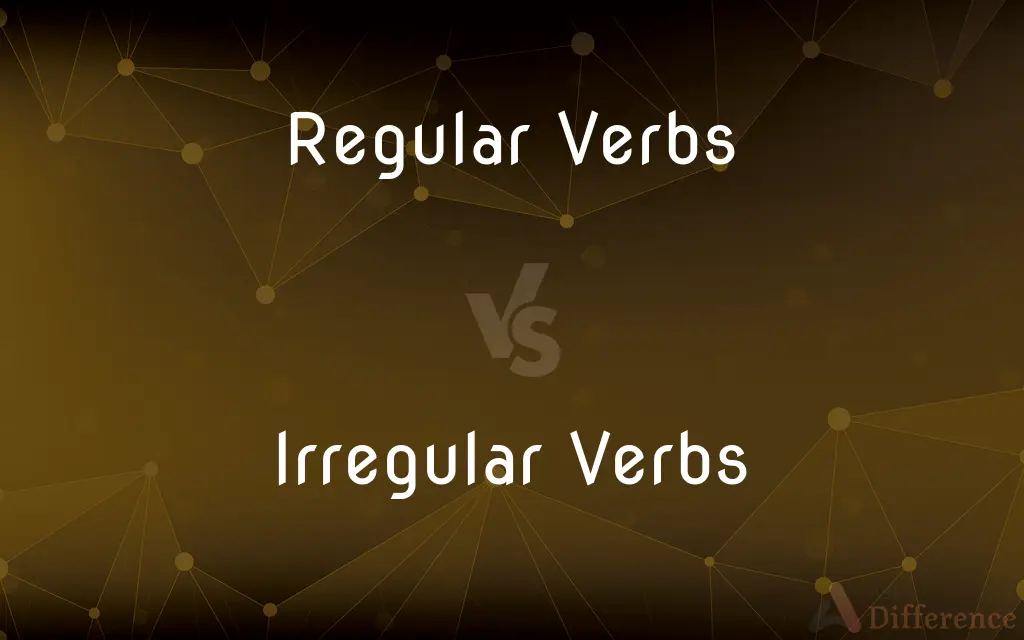Regular Verbs vs. Irregular Verbs — What's the Difference?
By Tayyaba Rehman — Published on October 8, 2023
Regular verbs form past tense by adding "-ed"; irregular verbs don't follow this rule. E.g., Regular: play-played; Irregular: go-went.

Difference Between Regular Verbs and Irregular Verbs
Table of Contents
ADVERTISEMENT
Key Differences
Regular verbs follow a predictable, "regular" pattern in their conjugation. Simply, they adhere to a standard formation of past and past participle forms by adding "-ed" or "-d". Irregular verbs, contrastingly, do not follow a uniform pattern, morphing into unique forms.
A crucial point of distinction between regular verbs and irregular verbs is consistency. Regular verbs consistently adopt the "-ed" ending across all their forms, providing language learners with a straightforward rule. Conversely, irregular verbs demand memorization due to their inconsistency in form alteration.
An ease of understanding and use is often associated with regular verbs because once the base verb is known, the simple addition of “-ed” forms the past and past participle forms. Irregular verbs introduce a layer of complexity as they require individual, case-by-case learning due to their lack of a unified rule.
The English language hosts significantly more regular verbs than their irregular counterparts, offering speakers a wide array of verbs that adhere to a common, simple conjugation rule. Yet, irregular verbs often include some of the most commonly used verbs, making their mastery equally imperative.
For learners, mastering regular verbs typically involves less effort and time due to their predictable nature. Learning irregular verbs, meanwhile, involves investing time in memorization and practice to ensure accurate usage in various tenses.
ADVERTISEMENT
Comparison Chart
Conjugation Rule
Follow a consistent pattern.
Do not follow a consistent pattern.
Past Tense Formation
Add “-ed” or "-d" to the base form.
Change in various, unpredictable ways.
Past Participle Formation
Add “-ed” or "-d" to the base form.
Often differ from their past forms.
Ease of Learning
Generally easier due to uniformity.
Can be challenging due to variability.
Usage Frequency
Plentiful but may be used less often.
Common verbs tend to be irregular.
Compare with Definitions
Regular Verbs
Future intentions with regular verbs use "will + base form".
I will call you later.
Irregular Verbs
Irregular verbs adopt unique forms in the past tense.
He went to the store.
Regular Verbs
Negative statements with regular verbs add "don't/doesn’t + base form".
She doesn’t like spinach.
Irregular Verbs
Irregular verbs maintain their base form in the present.
We see the bird.
Regular Verbs
Regular verbs maintain the base form in present tense.
They walk to school daily.
Irregular Verbs
Past participles of irregular verbs are often distinct.
She has eaten breakfast.
Regular Verbs
The past participle of regular verbs also employs “-ed.”
She has worked here for years.
Irregular Verbs
Negative structures with irregular verbs add "don't/doesn’t + base form".
He doesn’t know the answer.
Regular Verbs
Regular verbs consistently add “-ed” for past forms.
He played soccer yesterday.
Irregular Verbs
Future formations with irregular verbs use "will + base form".
They will have a meeting.
Common Curiosities
Is the past participle of regular verbs always formed by adding “-ed”?
Yes, regular verbs add “-ed” for the past participle.
What is the simplest rule for conjugating regular verbs in the past?
Add "-ed" to the base form.
Are irregular verbs typically common or rare in daily English?
Many common verbs in English are irregular.
Can a verb be both regular and irregular?
No, verbs are either regular or irregular, not both.
How can I learn irregular verb forms effectively?
Through memorization and practice in context.
Do regular verbs always follow the “-ed” rule for past forms?
Yes, regular verbs always use “-ed” for past forms.
Can irregular verbs have the same form in present, past, and past participle?
Yes, some irregular verbs, like "put," have the same form in all tenses.
Are regular verbs more prevalent in the English language?
Yes, regular verbs are more numerous but irregular verbs are often more commonly used.
How are future tenses formed with regular verbs?
Use "will" + the base form of the verb.
Do regular verbs have consistent spelling when “-ed” is added?
Mostly, but watch for spelling rules (e.g., “try” becomes “tried”).
How do irregular verbs form the past tense?
They change in various, unique ways.
Are all verbs either regular or irregular?
Yes, all verbs are categorized as either regular or irregular.
Is it possible for a new verb to be irregular?
It’s rare; new verbs tend to adopt regular conjugation.
Can irregular verbs become regular over time?
Yes, language evolution can sometimes regularize irregular verbs.
Is there a pattern to follow to determine if a verb is irregular?
No, irregular verb forms must typically be memorized as there’s no single pattern.
Share Your Discovery

Previous Comparison
Cost Of Capital vs. Capital Structure
Next Comparison
Natural Science vs. Social ScienceAuthor Spotlight
Written by
Tayyaba RehmanTayyaba Rehman is a distinguished writer, currently serving as a primary contributor to askdifference.com. As a researcher in semantics and etymology, Tayyaba's passion for the complexity of languages and their distinctions has found a perfect home on the platform. Tayyaba delves into the intricacies of language, distinguishing between commonly confused words and phrases, thereby providing clarity for readers worldwide.












































